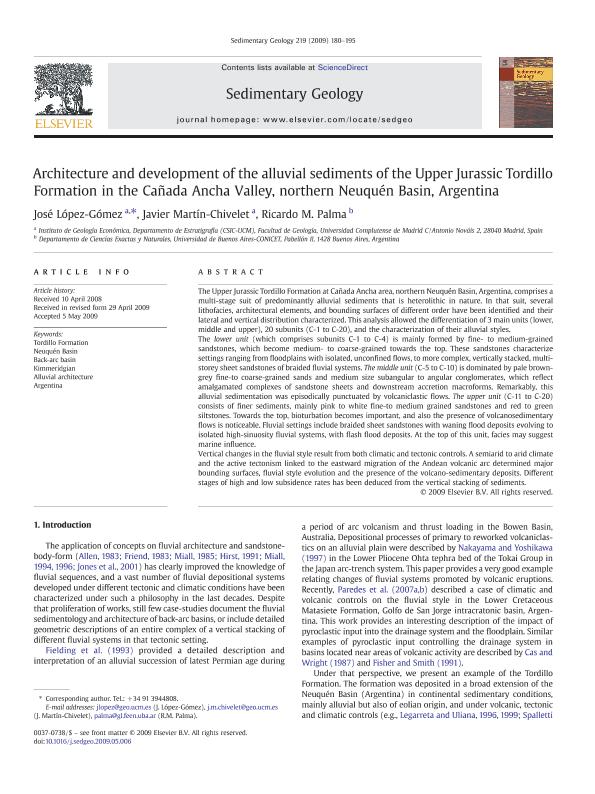Mostrar el registro sencillo del ítem
dc.contributor.author
López Gómez, José
dc.contributor.author
Martín Chivelet, Javier
dc.contributor.author
Palma, Ricardo Manuel

dc.date.available
2019-10-04T17:59:00Z
dc.date.issued
2009-07
dc.identifier.citation
López Gómez, José; Martín Chivelet, Javier; Palma, Ricardo Manuel; Architecture and development of the alluvial sediments of the Upper Jurassic Tordillo Formation in the Cañada Ancha Valley, northern Neuquén Basin, Argentina; Elsevier Science; Sedimentary Geology; 219; 1-4; 7-2009; 180-195
dc.identifier.issn
0037-0738
dc.identifier.uri
http://hdl.handle.net/11336/85240
dc.description.abstract
The Upper Jurassic Tordillo Formation at Cañada Ancha area, northern Neuquén Basin, Argentina, comprises a multi-stage suit of predominantly alluvial sediments that is heterolithic in nature. In that suit, several lithofacies, architectural elements, and bounding surfaces of different order have been identified and their lateral and vertical distribution characterized. This analysis allowed the differentiation of 3 main units (lower, middle and upper), 20 subunits (C-1 to C-20), and the characterization of their alluvial styles. The lower unit (which comprises subunits C-1 to C-4) is mainly formed by fine- to medium-grained sandstones, which become medium- to coarse-grained towards the top. These sandstones characterize settings ranging from floodplains with isolated, unconfined flows, to more complex, vertically stacked, multi-storey sheet sandstones of braided fluvial systems. The middle unit (C-5 to C-10) is dominated by pale brown-grey fine-to coarse-grained sands and medium size subangular to angular conglomerates, which reflect amalgamated complexes of sandstone sheets and downstream accretion macroforms. Remarkably, this alluvial sedimentation was episodically punctuated by volcaniclastic flows. The upper unit (C-11 to C-20) consists of finer sediments, mainly pink to white fine-to medium grained sandstones and red to green siltstones. Towards the top, bioturbation becomes important, and also the presence of volcanosedimentary flows is noticeable. Fluvial settings include braided sheet sandstones with waning flood deposits evolving to isolated high-sinuosity fluvial systems, with flash flood deposits. At the top of this unit, facies may suggest marine influence. Vertical changes in the fluvial style result from both climatic and tectonic controls. A semiarid to arid climate and the active tectonism linked to the eastward migration of the Andean volcanic arc determined major bounding surfaces, fluvial style evolution and the presence of the volcano-sedimentary deposits. Different stages of high and low subsidence rates has been deduced from the vertical stacking of sediments.
dc.format
application/pdf
dc.language.iso
eng
dc.publisher
Elsevier Science

dc.rights
info:eu-repo/semantics/openAccess
dc.rights.uri
https://creativecommons.org/licenses/by-nc-sa/2.5/ar/
dc.subject
ALLUVIAL ARCHITECTURE
dc.subject
ARGENTINA
dc.subject
BACK-ARC BASIN
dc.subject
KIMMERIDGIAN
dc.subject
NEUQUÉN BASIN
dc.subject
TORDILLO FORMATION
dc.subject.classification
Geología

dc.subject.classification
Ciencias de la Tierra y relacionadas con el Medio Ambiente

dc.subject.classification
CIENCIAS NATURALES Y EXACTAS

dc.title
Architecture and development of the alluvial sediments of the Upper Jurassic Tordillo Formation in the Cañada Ancha Valley, northern Neuquén Basin, Argentina
dc.type
info:eu-repo/semantics/article
dc.type
info:ar-repo/semantics/artículo
dc.type
info:eu-repo/semantics/publishedVersion
dc.date.updated
2019-10-01T14:52:09Z
dc.journal.volume
219
dc.journal.number
1-4
dc.journal.pagination
180-195
dc.journal.pais
Países Bajos

dc.journal.ciudad
Amsterdam
dc.description.fil
Fil: López Gómez, José. Universidad Autónoma de Madrid; España
dc.description.fil
Fil: Martín Chivelet, Javier. Universidad Autónoma de Madrid; España
dc.description.fil
Fil: Palma, Ricardo Manuel. Consejo Nacional de Investigaciones Científicas y Técnicas. Oficina de Coordinación Administrativa Ciudad Universitaria. Instituto de Estudios Andinos "Don Pablo Groeber". Universidad de Buenos Aires. Facultad de Ciencias Exactas y Naturales. Instituto de Estudios Andinos "Don Pablo Groeber"; Argentina
dc.journal.title
Sedimentary Geology

dc.relation.alternativeid
info:eu-repo/semantics/altIdentifier/doi/http://dx.doi.org/10.1016/j.sedgeo.2009.05.006
dc.relation.alternativeid
info:eu-repo/semantics/altIdentifier/url/https://www.sciencedirect.com/science/article/pii/S0037073809001262
Archivos asociados
